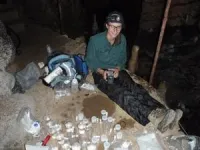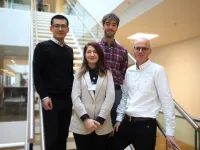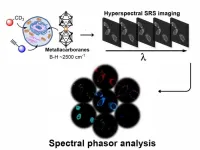(Press-News.org)
“The world isn’t doing terribly well in averting global ecological collapse,” says Dr Florian Rabitz, a researcher at Kaunas University of Technology (KTU), Lithuania, the author of a new monograph Transformative Novel Technologies and Global Environmental Governance recently published by Cambridge University Press.
Greenhouse gas emissions, species extinction, ecosystem degradation, chemical pollution, and more are threatening the Earth’s future. Despite decades of international agreements and countless high-level summits, success in forestalling this existential crisis has remained elusive, says Dr Rabitz.
In his new monograph, the KTU researcher delves into the intersection of cutting-edge technological solutions and the global environmental crisis. The author explores how international institutions respond (or fail to respond) to high-impact technologies that have been the subject of extensive debate and controversy.
“Some of the proposed solutions are more intrusive than others: they might offer a boon for environmental sustainability but they might also create considerable problems for the global environment and human societies. Such Transformative Novel Technologies remain unrealised: whether they will eventually deliver on their promise, and whether their associated perils can be avoided or at least minimised, depends to a large degree on the availability of adequate governance mechanisms,” explains Dr Rabitz.
Biotechnology to fight biodiversity loss
For example, one of the chapters in the monograph focuses on the broader field of biotechnology, and the potential role of novel biotechnologies in nature conservation. The ongoing biodiversity loss, provoked by invasive alien species (non-native organisms, disrupting the ecosystems into which they have been introduced due to human activities) is one of the characteristics of the current planetary crisis. The world’s leading scientific and policy organisations have been grappling with the urgent need to address this issue.
“The UN acknowledges that target 15.8 of the Sustainable Development Goals, aiming to prevent and significantly reduce the impact of biological invasions on land- and water ecosystems by 2020, has so far not been reached,” says Dr Rabitz.
He goes on to explain that scientists are currently exploring a variety of biotechnological countermeasures, including so-called gene drive systems that might effectively counteract invasive alien species through rapid and ecosystem-wide genetic engineering.
However, the use of these technologies introduces unprecedented risks and challenges that demand careful consideration and international collaboration. Gene drive systems, in particular, have become the subject of intense political scrutiny on the global stage, engaging institutions such as the Convention on Biological Diversity and the World Health Organization.
The problem with novel technologies is their unprecedented nature
Dr Rabitz believes that transformative novel technologies, such as those currently under consideration for combatting climate change through large-scale manipulation of planetary reflectivity, require adequate governance solutions to reap their potential benefits or to reduce their potential harm. Yet, these solutions are unreachable so far.
“What I show in my book is that effective international responses are few and far between, while there is a broad range of international institutions that could, in principle, provide governance solutions for the challenges and opportunities which those technologies pose, in practice, they often fail to do so,” says Dr Rabitz.
He presumes that there are different reasons why this might be the case, one of them being the unusual and partially unprecedented nature of those technologies, which leads to a significant governance gap at the international level. According to him, this is not just the case in the environmental domain. Artificial Intelligence is another example, where the absence of international regulatory activity stands in stark contrast to the political, economic and social stakes
“We might well disagree on what precisely should be done with these and other types of transformative novel technologies – for instance, whether to restrict them, to ban them or to facilitate their responsible development and use. But in one way or another, the absence of appropriate international solutions for a wide range of momentous, contemporary technological developments is bound to create problems sooner or later,” says Dr Rabitz.
END
A leading researcher has been awarded a prestigious Royal Society Fellowship worth over £1.4 million to study how dryland landscapes respond to a changing climate.
Dr Monika Markowska will join Northumbria University in January 2024 as part of her Royal Society University Research Fellowship. The Royal Society is the world’s oldest independent scientific academy, bringing together many of the world’s most distinguished scientists drawn from all areas of science, engineering, and medicine.
Specialising in the variability of the Earth’s past climate, Dr Monika Markowska is an Isotope Geochemist, who is currently based at Max Planck ...
Production of biological substances for medicine using genetically engineered yeast cells shows new promising results in basic research from an international team of researchers. In 2022, the researchers attracted international attention by programming the longest-ever biosynthetic pathway - or 'assembly line' - into a microbial cell factory and designing it to produce biological substances for cancer drugs.
In an article published in the scientific journal Nature Chemical Biology, Biosynthesis of natural and halogenated plant monoterpene indole alkaloids in yeast, the researchers now present results with the artificial production ...
CÚRAM researchers at University of Galway, together with colleagues at the Centre for Molecular Nanometrology at University of Strathclyde have published work unveiling the inner workings of cells.
Published recently in the German scientific journal Angewandte Chemie, the work provides a deeper understanding of the way components within cells are interconnected. This research has been on the agenda of scientists worldwide for many years, and has yielded plenty of useful information on how certain diseases behave.
Through cellular visualisation using SRS microscopy, ...
Actuators, which convert electrical energy into motion or force, play a pivotal role in daily life, albeit often going unnoticed. Soft material-based actuators, in particular, have gained scientific attention in recent years due to their lightweight, quiet operation, and biodegradability. A straightforward approach to creating soft actuators involves employing multi-material structures, such as "pockets" made of flexible plastic films filled with oils and coated with conductive plastics. When subjected to electrical activation, the film displaces the fluid and contracts the pocket, similar to a biological muscle. This system ...
DUARTE, Calif., Nov. 10, 2023 – In a breakthrough for human milk science, researchers at City of Hope, Los Angeles, have dosed the first patient in a Phase 2a clinical trial evaluating a novel therapy for blood cancer patients undergoing allogeneic hematopoietic stem cell transplantation. The investigational treatment, PBCLN-010 in combination with PBCLN-014, combines human milk sugars with a strain of bacteria found in the gut of nursing infants.
“Previous clinical trials of PBCLN-010 + PBCLN-014 have shown that it can safely and predictably control the gut microbiome ...
With an eye toward a decade ahead that promises change, opportunity, and challenge, the University of Virginia on Friday launched its Futures Initiative to help plan for the next 10 years in higher education.
Over the next year, a group of thought leaders from across the University, known as the Futures Initiative Group, will examine the current drivers of change in academia, such as artificial intelligence and large language models like ChatGPT, while also looking ahead to the eventual impact of sensor technology, virtual classrooms, the Internet of Things, and myriad other technological changes.
The goal of the initiative—which was announced at Datapalooza 2023, an annual event ...
INDIANAPOLIS -- Regenstrief Institute, the International Medical Informatics Association (IMIA), the International Academy of Health Sciences Informatics (IAHSI) and the American Medical Informatics Association (AMIA) are hosting a mini-summit at the AMIA 2023 Annual Symposium to address how informatics can help resolve health issues caused by climate change. The event will bring together national and international experts to form an informatics infrastructure that will highlight and bring exposure to climate change's effects on health.
The event Mini-Summit 2023 -- Climate and health: How can informatics help? was planned because of the growing awareness around ...
HOUSTON ― Howard Meyers, of Dallas, Texas, a member of The University of Texas MD Anderson Cancer Center Board of Visitors (BOV), has committed $25 million to The University of Texas MD Anderson Cancer Center to establish the Meyers Institute for Oncology Nursing. The first of its kind, the Meyers Institute for Oncology Nursing will support and develop nurses throughout their careers by providing educational, professional and wellness-based resources tailored to cancer care nurses and nurse scientists. This ...
Some individuals with anti-Ro/SSA antibodies (anti–Sjögren's-syndrome–related antigen A autoantibodies, also called anti-Ro antibodies) have autoimmune diseases such as lupus or Sjögren's syndrome, but many have no symptoms. A clinical trial published in Arthritis & Rheumatology found that high levels of these antibodies in pregnant women are associated with fetal atrioventricular block (AVB), which occurs when inflammation and subsequent scarring prevent electric signals from the heart’s atria from reaching the ventricles. The disease ...
In a post hoc analysis of the phase 2 NOBILITY trial, researchers found that treatment with obinutuzumab—an antibody that targets a protein expressed on certain immune cells—was superior to placebo for preserving kidney function and preventing flares in patients with lupus nephritis, a kidney condition associated with the autoimmune disease lupus.
In the analysis, which is published in Arthritis & Rheumatology, compared with standard-of-care treatment alone, the addition of obinutuzumab to lupus nephritis treatment reduced the risk of developing a composite outcome of death, fall in kidney function, or treatment failure by 60%. Adding obinutuzumab ...






